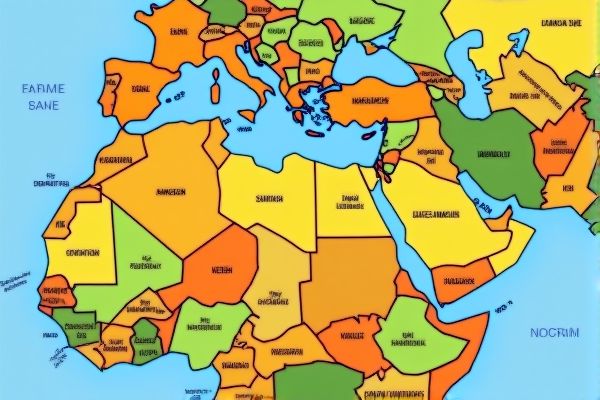
Ethiopia is experiencing a growing demand for Geographic Information Systems (GIS) professionals, driven by developments in agriculture, urban planning, and environmental management. Organizations such as government agencies, non-profits, and private companies seek skilled GIS analysts and specialists to enhance spatial data analysis and improve decision-making processes. Universities and training institutes are incorporating GIS into their curricula, allowing students to gain relevant skills that align with industry needs. Networking through local GIS communities and online platforms can be advantageous for securing job opportunities and staying informed about emerging trends in the field.
Job Description
GIS jobs in Ethiopia encompass various roles focused on Geographic Information Systems, which are essential for urban planning, resource management, and environmental sustainability. Positions often require proficiency in mapping software like ArcGIS or QGIS, as well as analytical skills to interpret spatial data effectively. Employers in Ethiopia typically seek candidates with a background in geography, environmental science, or related fields, along with experience in data collection and management. Opportunities exist across government agencies, non-governmental organizations, and private companies, reflecting the growing importance of GIS in national development initiatives.
Requirement
GIS jobs in Ethiopia typically require a degree in geography, remote sensing, environmental science, or a related field. Proficiency in GIS software such as ArcGIS or QGIS is essential, along with strong analytical skills to interpret spatial data. Experience with cartography, data collection, and fieldwork is often advantageous, as many positions involve collaborating with local communities on development projects. Familiarity with Ethiopia's unique geographical and cultural landscape can greatly enhance your candidacy and effectiveness in these roles.
Salary and Perks Expected
GIS jobs in Ethiopia offer competitive salaries that typically range between $500 to $2,000 per month, depending on experience and the specific sector. Many organizations provide additional perks such as health insurance, paid leave, and opportunities for professional development, enhancing the overall compensation package. The demand for GIS professionals is growing in sectors like agriculture, urban planning, and environmental management, reflecting the increasing reliance on data-driven decision-making. You can enhance your employability by acquiring relevant certifications and gaining experience in GIS software and tools.
Similar Job Names
- GIS Analyst
- GIS Technician
- GIS Developer
- Senior GIS Specialist
- Remote Sensing Specialist
- Geospatial Data Scientist
- Cartographer
- GIS Project Manager
- Geospatial Analyst
- Urban Planner
- Land Surveyor
- Environmental Scientist
- Data Analyst
- GIS Consultant
- Spatial Data Engineer
- Infrastructure Planner
- Agricultural GIS Specialist
- Geographic Information Officer
- Remote Sensing Analyst
- Disaster Management Specialist
Job Expectation Concept
GIS jobs in Ethiopia are becoming increasingly essential as the country invests in infrastructure and development projects. Your expertise in geospatial analysis can contribute significantly to urban planning, environmental management, and resource allocation. Organizations across various sectors, including government, NGOs, and private companies, seek professionals who can harness GIS technology to address local challenges. As Ethiopia continues to grow, the demand for skilled GIS specialists is expected to rise, providing numerous career opportunities.
Career Advantage and Weakness
GIS jobs in Ethiopia present a significant career advantage due to the increasing demand for geospatial technology professionals in various sectors, including agriculture, urban planning, and environmental management. The Ethiopian government and international organizations are investing in infrastructure and development projects, creating numerous opportunities for skilled GIS practitioners. However, challenges exist, such as limited access to advanced technology and insufficient training programs that can hinder job performance and career growth. Embracing continuous learning and adapting to new software and tools can help mitigate these weaknesses and enhance your career prospects in the Ethiopian GIS job market.
Important Thing Must Know
GIS jobs in Ethiopia are increasingly in demand due to the country's focus on infrastructure development and natural resource management. Various sectors, including agriculture, urban planning, and environmental conservation, rely heavily on Geographic Information Systems to analyze spatial data and improve decision-making. You can find opportunities in government agencies, non-governmental organizations, and private firms that are leveraging GIS technology for developmental projects. Proficiency in software such as ArcGIS and QGIS is essential to remain competitive in the job market. Networking through local educational institutions and GIS forums can enhance your chances of securing a position in this evolving field.
Alternative Career Options
The geographic information systems (GIS) field in Ethiopia offers diverse career alternatives that extend beyond traditional roles. Opportunities exist in urban planning, environmental management, and disaster response, allowing professionals to apply their skills in meaningful ways. Non-governmental organizations (NGOs) and governmental agencies actively seek GIS specialists to enhance resource management and community development projects. Your expertise can contribute significantly to improving infrastructure and sustainability in various regions across the country.
Companies List
- Government agencies
- Mining companies
- Telecommunications firms
- Agricultural organizations
- Environmental consulting firms
- Urban planning authorities
- Transportation and logistics companies
- Non-governmental organizations (NGOs)
- Oil and gas industries
- Real estate developers
List of Ideal City
Several cities in Ethiopia are prime locations for GIS job opportunities, particularly due to their growing infrastructure and development projects. Addis Ababa, the capital, hosts numerous governmental and non-governmental organizations that require GIS expertise for urban planning and resource management. Furthermore, cities like Hawassa and Mekelle are emerging hubs for environmental and agricultural projects, creating a demand for GIS professionals. Regional development initiatives in these cities present valuable prospects for your career in geographic information systems.
 jobs-ethiopia.com
jobs-ethiopia.com